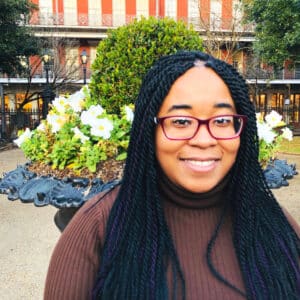
Writer, translator and NCW resident Paige Aniyah Morris writes about her experience staying in Norwich, her first port of call finding a quiet place to seek solace.
Paige shares her increased understanding of herself following her recent autism diagnosis, and how she managed to find moments of calm while exploring a new city.
This residency was supported by the Literature Translation Institute of Korea.
Read on to discover Paige’s piece.
The first thing I sought out upon arriving in Norwich was neither the best spot for lunch (The Kimchi on Brigg Street if you can get a seat) nor the best café to work in (hands-down The Yard Coffee at Pivotal House). No, what I needed to find, first and foremost, was the quietest corner of the city to which I could retreat in the event of an interior emergency.
About a year ago now, I was clinically diagnosed as being on the autism spectrum. With this one discovery, so many components of my life seemed to snap suddenly into alignment. A lifelong love of routine. An aversion to bright lights and blaring noises. The feeling that the world itself was too much for me—too painful, too pungent, too loud. Over the years, I had become rather adept at masking, or presenting as neurotypical people do, by smiling and nodding through daily situations that felt like unrelenting attacks on my senses. Yet upon realizing I was autistic, I felt I had gained permission to be honest about how I experienced the world and what I needed to survive in it. For me, being autistic means that I value time alone with my passions, that I can remain immersed in a good story for hours without once coming up for air, but also that I cannot help feeling suffocated in rooms full of strangers and need to tap out of most social interactions within a few minutes. It means that I savor certainty and struggle to handle sudden changes to the flows and patterns I find comfort in.

So when I was invited by the National Centre for Writing and the Literature Translation Institute of Korea to live for a month in residency in Norwich, translating in a city and country I had never once set foot in before, naturally I short-circuited. I was thrilled about the opportunity, but anxious, too. Drawing on my classic tendency to manage anxiety through extensive planning, I opened up dozens of internet browser tabs with maps, articles, and messages and got to work outlining an itinerary that more closely resembled a contingency plan. Of course I carved out plenty of time to browse the bookstores. I made a list of restaurants to visit and sights to see, complete with the most convenient travel routes from place to place. I felt more prepared, and thus more excited, after mapping out the month in this way. Yet I knew that all the planning in the world would not help me find that most essential thing. My immediate must-do upon arriving in Norwich would have to be tracking down at least one pocket of the city where the noise dulled, where I could be alone.
The last place I expected to end up my first week in residency was the movie theater, though in hindsight, I should have known I would. Unlike castles and cobblestone roads, cinemas were easily found elsewhere. Yet there I was, purchasing a ticket for an early afternoon showing of Spiderman: Across the Spider-Verse. I wasn’t desperate to see the newest installment in the series so much as I was desperate for a place to unwind.
Those first few days in Norwich, I had been predictably overwhelmed by all that the City of Stories had to offer. I had spent much of that first week wandering around in a sort of trance, gaping open-mouthed at the buildings dating back centuries, in sheer disbelief that I was there. When I wasn’t wandering, I was working, and finding the work overwhelming as well. During the residency, I was mainly focused on revising my co-translation with Emily Yae Won of Han Kang’s We Do Not Part, a novel unsparing in its account of the Jeju Uprising and its aftermath, the many ghosts produced by state violence and slaughter. One day, after I had spent the morning immersed in fine-tuning an especially brutal passage, I decided I needed a break, someplace to clear my mind. That day, for whatever reason, the quietest place I could imagine in an otherwise bustling little city was a movie theater.
The ODEON theater in Norwich sits in the heart of a cluster of riverside businesses on Wherry Road. To get there, I would leave the cottage and walk up St. Ann’s Lane for not even a minute before Lady Julian Bridge came into view. I crossed the bridge as ducks traversed the River Wensum underfoot. The cinema loomed straight ahead, impossible to miss.

While scanning showtimes, I learned that ODEON theaters throughout the United Kingdom offered open captions on most of their films. This stirred something in my heart—or perhaps in my brain, which sometimes struggles to process speech in real time due to its particular neurodivergent wiring. As I took my anonymous seat in the dark, I felt a familiar sense of comfort settle over me.
Movie theaters have long been a favorite haunt of mine. Even before I knew I was autistic, I often sought refuge in the cool, dark rooms, where I knew I was promised a spell of relative calm for at least as long as the runtime on the film I was there to see. During the COVID-19 pandemic, as more theaters around the world shuttered or else screened blockbuster films to empty auditoriums, I experienced the acute loss of a once-guaranteed space of solace. The point for me was never the movies—it was the quiet. By the time I leave Norwich, I will have spent hours in the ODEON, but less than a dozen of those hours actually watching films. The remaining time will have been spent in various states of aloneness, translating pages in the Costa Coffee in the lobby or else reading novels on the loveseat near the ticket check as I wait for a show to begin.
Most times after a movie ends, I step outside into an overcast yet dazzlingly bright afternoon. The day still young, I continue my search.
While the movie theater makes for an excellent escape in a pinch, Norwich soon reveals to me plenty of other retreats.

The Refectory at Norwich Cathedral in the early hours of the morning before the city has begun to stir in earnest is an easy choice. Though the café is somewhat removed from the church itself, I feel the resonance of the minor chords from a pipe organ in my fingertips as I dive back into translating the somber, wintry world of We Do Not Part. By noon or so, the tables in the Refectory have filled up, and I know it’s time to move on.
Starting around my second week in residency, I become a regular patron of the Norfolk and Norwich Millennium Library. I usually aim to arrive not too long after it’s opened for the day. The café in the lobby serves an excellent porridge and a warmly spiced chai latte, which become my standard breakfast fare as I spend many days at a table for one, immersed in my work and able to forget my surroundings, however stunned they had left me initially.
The constant rain showers in Norwich create many unexpected pockets of quiet throughout the city, too. The shops and eateries on Tombland sit mostly empty on rainy days. One of these is Carberrys, a humble café near the river with a lovable golden retriever lazing in the doorway.
When I search for solace, I am not chasing after emptiness. The absence of others is not what puts me at ease. It is entering a space in which quiet and self-reflection are not only appropriate but encouraged. Writers and translators are expected to wield language constantly and masterfully, yet my autism often manifests as a withdrawal into silence. As much as I love working with words, language is often the first loss I suffer in moments when I am overwhelmed. In seeking solace, I am seeking a space that demands nothing of me, let alone fluency, at least for a little while.

At the end of any day in Norwich, a walk around the city ends where it begins for me: the Dragon Hall Cottage on St. Anne’s Lane. Here, I work at a desk in a room with a window facing the garden and Dragon Hall. Rich light fills my workspace well into the evening, courtesy of the extended hours of the summer sun. It is here that I pull inspiration, quite literally, off the shelves of a bookcase filled with the works of past writers and translators in residence. And it is here that I return, time and time again, to the work I often find solace in, even as it overwhelms the senses.
In the evenings, I can hear the pubs of Norwich open their doors and the streets outside come alive with sound. Delighted shouts and vulgar spats, the frenzied squawks of geese, glasses clinking in the garden on the weekends after a wedding has taken place earlier in the day. By then, I am most likely in bed with a book, listening to all the lives being lived beyond the cottage walls. Here, too, I find comfort in being just on the outskirts of the noise.
 Paige Aniyah Morris is a writer and translator from Jersey City, New Jersey, USA who divides her time between the United States and Korea. She holds BAs in Literary Arts and Ethnic Studies from Brown University and an MFA in Fiction from Rutgers University. The recipient of awards and honors from the Fulbright Program, the American Literary Translators Association, the Daesan Foundation, the Literature Translation Institute of Korea, and others, she has translated works by writers including Pak Kyongni, Chang Kang-myoung, Ji-min Lee, Seo Jang-won, and is the co-translator with Emily Yae Won of Han Kang’s forthcoming We Do Not Part. In both her writing and translations, she is deeply interested in the speculative as well as the stories of those on the social margins, including stories by and about gender and sexual minorities, racial and ethnic minorities, migrants, and people with disabilities. During her residency, she hopes to make meaningful connections with other members of the global literary community in Norwich and apply the lessons learned to her continued practice as a Black American translator of Korean literature.
Paige Aniyah Morris is a writer and translator from Jersey City, New Jersey, USA who divides her time between the United States and Korea. She holds BAs in Literary Arts and Ethnic Studies from Brown University and an MFA in Fiction from Rutgers University. The recipient of awards and honors from the Fulbright Program, the American Literary Translators Association, the Daesan Foundation, the Literature Translation Institute of Korea, and others, she has translated works by writers including Pak Kyongni, Chang Kang-myoung, Ji-min Lee, Seo Jang-won, and is the co-translator with Emily Yae Won of Han Kang’s forthcoming We Do Not Part. In both her writing and translations, she is deeply interested in the speculative as well as the stories of those on the social margins, including stories by and about gender and sexual minorities, racial and ethnic minorities, migrants, and people with disabilities. During her residency, she hopes to make meaningful connections with other members of the global literary community in Norwich and apply the lessons learned to her continued practice as a Black American translator of Korean literature.
This residency is supported by the Literature Translation Institute of Korea.
You may also like...
‘Memories of Norwich’ by Anxhela Hoxha Çikopano
Read theatre director, translator and NCW resident Anxhela’s memories of Norwich, meeting local residents, and contending with feelings of homesickness.

7th September 2023
Read ‘St. Gregory’s’ by journalist Soobin Kim
‘The delight of the utterly useless’

6th September 2022
Read ‘Golden Dog Lane’ by Sharlene Teo
‘The unstudied tranquillity of a small city caught in a still, quiet moment’

17th May 2019






